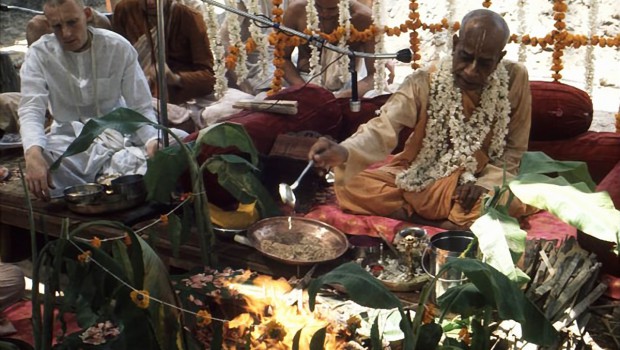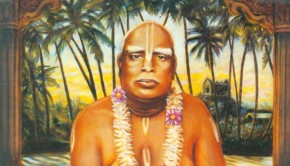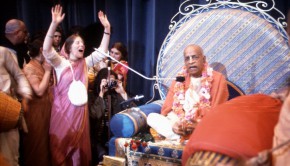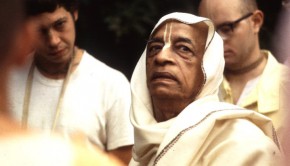Initiation–All Past Karma is Burned Up?
When someone is initiated they have received transcendental knowledge and their past karma is burned up, they must be a bit like a new born baby. Why is it they still appear and behave the same and even fall down, where has that divine knowledge gone?
“When someone is initiated they have received transcendental knowledge and their past karma is burned up, they must be a bit like a new born baby. Why is it they still appear and behave the same and even fall down, where has that divine knowledge gone? “
This is often misunderstood. Formality of initiation: ceremony of name giving and bananas and sesame seeds thrown in fire yajna is not when past Karma is burned off. This is why Srila Prabhupada states this formality “That is not very important thing.”
761016iv.cha Conversations
Prabhupada: Well, initiation or no initiation, first thing is knowledge. (break) …knowledge. Initiation is formality. Just like you go to a school for knowledge, and admission is formality. That is not very important thing.
Factually, Karma is burned up when the devotee is on the platform of understanding AND acting in his svarupa, constitutional relationship with Krsna. The *initiation* referred in this context is of the MADHYAMA adhikari.”(NoI 5) A madhyama-adhikari has received *spiritual* initiation ” This confirms with Antya 4.192 please read below.
Further evidence to support this is(NoI 5) “and has been *fully* engaged by him(Spiritual master) in the *transcendental loving service* of the Lord.” This confirms with Antya 4.192 please read below.
The mistake is made by devotees when they disregard this SPIRITUAL INITIATION on the MADHYAMA ADHIKARI. THIS initiation is NOT formality. This is transcendental knowledge (dvya jnana or DIKSA) Srila Prabhupada is offering this to us all PROVIDED we come to surrender unto His Divine Grace and chant PURE offenseless Hare Krishna. The defect is many “devotees” do not want Srila Prabhupada as diksa guru and therefore reject his diksa.
Kanistha is not fit for transcendental loving service yet– because even in the stage of fully qualified brahmana he is subject to contamination in material mode of goodness. Brahmana has to transcend the material mode of goodness (sattava) to come to the scientific understanding, see,hear and experience Krsna. The Vaisnava platform is superior in that he has attained this unalloyed position of *loving* God (suddha sattva– pure goodness). Krsna speaks to the Vaisnava. There is LOVING receprocation *exchange loving mellows*.
NoI 5
In order to intelligently apply the sixfold loving reciprocations mentioned in the previous verse, one must select proper persons with careful discrimination. Srila Rupa Gosvami therefore advises that we should meet with the Vaisnavas in an appropriate way, according to their particular status. In this verse he tells us how to deal with three types of devotees–the kanistha-adhikari, madhyama-adhikari and uttama-adhikari. The kanistha-adhikari is a neophyte who has received the hari-nama initiation from the spiritual master and is trying to chant the holy name of Krsna. One should respect such a person within his mind as a kanistha-vaisnava. A madhyama-adhikari has received spiritual initiation from the spiritual master and has been fully engaged by him in the transcendental loving service of the Lord. The madhyama-adhikari should be considered to be situated midway in devotional service. The uttama-adhikari, or highest devotee, is one who is very advanced in devotional service. An uttama-adhikari is not interested in blaspheming others, his heart is completely clean, and he has attained the realized state of unalloyed Krsna consciousness. According to Srila Rupa Gosvami, the association and service of such a maha-bhagavata, or perfect Vaisnava, are most desirable.
Antya 4.192 T Sanatana Gosvami Visits the Lord at Jagannatha Puri
diksa-kale bhakta kare atma-samarpana
sei-kale krsna tare kare atma-sama
SYNONYMS
diksa-kale–at the time of initiation; bhakta–the devotee; kare–does; atma–of himself; samarpana–full dedication; sei-kale–at that time; krsna–Lord Krsna; tare–him; kare–makes; atma-sama–as spiritual as Himself.
TRANSLATION
“At the time of initiation, when a devotee fully surrenders unto the service of the Lord, Krsna accepts him to be as good as Himself.
TEXT 193
sei deha kare tara cid-ananda-maya
aprakrta-dehe tanra carana bhajaya
SYNONYMS
sei deha–that body; kare–makes; tara–his; cit-ananda-maya–full of transcendental bliss; aprakrta-dehe–in that transcendental body; tanra–His; carana–feet; bhajaya–worships.
TRANSLATION
“When the devotee’s body is thus transformed into spiritual existence, the devotee, in that transcendental body, renders service to the lotus feet of the Lord.
TEXT 194
martyo yada tyakta-samasta-karma
niveditatma vicikirsito me
tadamrtatvam pratipadyamano
mayatma-bhuyaya ca kalpate vai
SYNONYMS
martyah–the living entity subjected to birth and death; yada–as soon as; tyakta–giving up; samasta–all; karmah–fruitive activities; nivedita-atma–a fully surrendered soul; vicikirsitah–desired to act; me–by Me; tada–at that time; amrtatvam–immortality; pratipadyamanah–attaining; maya–with Me; atma-bhuyaya–for becoming of a similar nature; ca–also; kalpate–is eligible; vai–certainly.
TRANSLATION
” ‘The living entity who is subjected to birth and death, when he gives up all material activities dedicating his life to Me for executing My order, and thus acts according to My direction, at that time he reaches the platform of immortality, and becomes fit to enjoy the spiritual bliss of exchange of loving mellows with Me.‘
PURPORT
This is a quotation from Srimad-Bhagavatam (11.29.34). At the time of initiation, a devotee gives up all his material conceptions. Therefore, being in touch with the Supreme Personality of Godhead, he is situated on the transcendental platform. Thus having attained knowledge and the spiritual platform, he always engages in the service of the spiritual body of Krsna. When one is freed from material connections in this way, his body immediately becomes spiritual, and Krsna accepts His service. However, Krsna does not accept anything from a person with a material conception of life. When a devotee no longer has any desire for material sense gratification, in his spiritual identity he engages in the service of the Lord, for his dormant spiritual consciousness awakens. This awakening of spiritual consciousness makes his body spiritual, and thus he becomes fit to render service to the Lord. Karmis may consider the body of a devotee material, but factually it is not, for a devotee has no conception of material enjoyment. If one thinks that the body of a pure devotee is material, he is an offender, for that is a vaisnava-aparadha. In this connection one should consult Srila Sanatana Gosvami’s Brhad-bhagavatamrta (1.3.45 and 2.3.139).
Bg 4.19 T Transcendental Knowledge
yasya sarve samarambhah
kama-sankalpa-varjitah
jnanagni-dagdha-karmanam
tam ahuh panditam budhah
SYNONYMS
yasya–one whose; sarve–all sorts of; samarambhah–in all attempts; kama–desire for sense gratification; sankalpa–determination; varjitah–are devoid of; jnana–of perfect knowledge; agni–fire; dagdha–being burnt by; karmanam–the performer; tam–him; ahuh–declare; panditam–learned; budhah–of those who know.
TRANSLATION
One is understood to be in full knowledge whose every act is devoid of desire for sense gratification. He is said by sages to be a worker whose fruitive action is burned up by the fire of perfect knowledge.
PURPORT
Only a person in full knowledge can understand the activities of a person in Krsna consciousness. Because the person in Krsna consciousness is devoid of all kinds of sense-gratificatory propensities, it is to be understood that he has burned up the reactions of his work by *perfect knowledge of his constitutional position as the eternal servitor* of the Supreme Personality of Godhead. He is actually learned who has attained to such perfection of knowledge. Development of this knowledge of the eternal servitorship of the Lord is compared to fire. Such a fire, once kindled, can burn up all kinds of reactions to work.
evam prasanna-manaso
bhagavad-bhakti-yogatah
bhagavat-tattva-vijnanam
mukta-sangasya jayate
SYNONYMS
evam–thus; prasanna–enlivened; manasah–of the mind; bhagavat-bhakti–the devotional service of the Lord; yogatah–by contact of; bhagavat–regarding the Personality of Godhead; tattva–knowledge; vijnanam–scientific; mukta–liberated; sangasya–of the association; jayate–becomes effective.
TRANSLATION
Thus established in the mode of unalloyed goodness, the man whose mind has been enlivened by contact with devotional service to the Lord gains positive scientific knowledge of the Personality of Godhead in the stage of liberation from all material association.
PURPORT
In the Bhagavad-gita (7.3) it is said that out of many thousands of ordinary men, one fortunate man endeavors for perfection in life. Mostly men are conducted by the modes of passion and ignorance, and thus they are engaged always in lust, desire, hankerings, ignorance and sleep. Out of many such manlike animals, there is actually a man who knows the responsibility of human life and thus tries to make life perfect by following the prescribed duties. And out of many thousands of such persons who have thus attained success in human life, one may know scientifically about the Personality of Godhead Sri Krsna. In the same Bhagavad-gita (18.55) it is also said that scientific knowledge of Sri Krsna is understood only by the process of devotional service (bhakti-yoga).
The very same thing is confirmed herein in the above words. No ordinary man, or even one who has attained success in human life, can know scientifically or perfectly the Personality of Godhead. Perfection of human life is attained when one can understand that he is not the product of matter but is in fact spirit. And as soon as one understands that he has nothing to do with matter, he at once ceases his material hankerings and becomes enlivened as a spiritual being. This attainment of success is possible when one is above the modes of passion and ignorance, or, in other words, when one is actually a brahmana by qualification. A brahmana is the symbol of sattva-guna, or the mode of goodness. And others, who are not in the mode of goodness, are either ksatriyas, vaisyas, sudras or less than the sudras. The brahminical stage is the highest stage of human life because of its good qualities. So one cannot be a devotee unless one at least qualifies as a brahmana. The devotee is already a brahmana by action. But that is not the end of it. As referred to above, such a brahmana has to become a Vaisnava in fact to be actually in the transcendental stage. A pure Vaisnava is a liberated soul and is transcendental even to the position of a brahmana. In the material stage even a brahmana is also a conditioned soul because although in the brahminical stage the conception of Brahman or transcendence is realized, scientific knowledge of the Supreme Lord is lacking. One has to surpass the brahminical stage and reach the vasudeva stage to understand the Personality of Godhead Krsna. The science of the Personality of Godhead is the subject matter for study by the postgraduate students in the spiritual line. Foolish men, or men with a poor fund of knowledge, do not understand the Supreme Lord, and they interpret Krsna according to their respective whims. The fact is, however, that one cannot understand the science of the Personality of Godhead unless one is freed from the contamination of the material modes, even up to the stage of a brahmana. When a qualified brahmana factually becomes a Vaisnava, in the enlivened state of liberation he can know what is actually the Personality of Godhead.
SB 1.2.21 T Divinity and Divine Service
bhidyate hrdaya-granthis
chidyante sarva-samsayah
ksiyante casya karmani
drsta evatmanisvare
SYNONYMS
bhidyate–pierced; hrdaya–heart; granthih–knots; chidyante–cut to pieces; sarva–all; samsayah–misgivings; ksiyante–terminated; ca–and; asya–his; karmani–chain of fruitive actions; drste–having seen; eva–certainly; atmani–unto the self; isvare–dominating.
TRANSLATION
Thus the knot in the heart is pierced, and all misgivings are cut to pieces. The chain of fruitive actions is terminated when one sees the self as master.
PURPORT
Attaining scientific knowledge of the Personality of Godhead means seeing one’s own self simultaneously. As far as the identity of the living being as spirit self is concerned, there are a number of speculations and misgivings. The materialist does not believe in the existence of the spirit self, and empiric philosophers believe in the impersonal feature of the whole spirit without individuality of the living beings. But the transcendentalists affirm that the soul and the Supersoul are two different identities, qualitatively one but quantitatively different. There are many other theories, but all these different speculations are at once cleared off as soon as Sri Krsna is realized in truth by the process of bhakti-yoga. Sri Krsna is like the sun, and the materialistic speculations about the Absolute Truth are like the darkest midnight. As soon as the Krsna sun is arisen within one’s heart, the darkness of materialistic speculations about the Absolute Truth and the living beings is at once cleared off. In the presence of the sun, the darkness cannot stand, and the relative truths that were hidden within the dense darkness of ignorance become clearly manifested by the mercy of Krsna, who is residing in everyone’s heart as the Supersoul.
In the Bhagavad-gita (10.11) the Lord says that in order to show special favor to His pure devotees, He personally eradicates the dense darkness of all misgivings by switching on the light of pure knowledge within the heart of a devotee. Therefore, because of the Personality of Godhead’s taking charge of illuminating the heart of His devotee, certainly a devotee, engaged in His service in transcendental love, cannot remain in darkness. He comes to know everything of the absolute and the relative truths. The devotee cannot remain in darkness, and because a devotee is enlightened by the Personality of Godhead, his knowledge is certainly perfect. This is not the case for those who speculate on the Absolute Truth by dint of their own limited power of approach. Perfect knowledge is called parampara, or deductive knowledge coming down from the authority to the submissive aural receiver who is bona fide by service and surrender. One cannot challenge the authority of the Supreme and know Him also at the same time. He reserves the right of not being exposed to such a challenging spirit of an insignificant spark of the whole, a spark subjected to the control of illusory energy. The devotees are submissive, and therefore the transcendental knowledge descends from the Personality of Godhead to Brahma and from Brahma to his sons and disciples in succession. This process is helped by the Supersoul within such devotees. That is the perfect way of learning transcendental knowledge.
This enlightenment perfectly enables the devotee to distinguish spirit from matter because the knot of spirit and matter is untied by the Lord. This knot is called ahankara, and it falsely obliges a living being to become identified with matter. As soon as this knot is loosened, therefore, all the clouds of doubt are at once cleared off. One sees his master and fully engages himself in the transcendental loving service of the Lord, making a full termination of the chain of fruitive action. In material existence, a living being creates his own chain of fruitive work and enjoys the good and bad effects of those actions life after life. But as soon as he engages himself in the loving service of the Lord, he at once becomes free from the chain of karma. His actions no longer create any reaction.
770214r2.may Conversations
Prabhupada: Vaisnava is not so easy. The varnasrama-dharma should be established to become a Vaisnava. It is not so easy to become Vaisnava.
Hari-sauri: No, it’s not a cheap thing.
Prabhupada: Yes. Therefore this should be made. Vaisnava, to become Vaisnava, is not so easy. If Vaisnava, to become Vaisnava is so easy, why so many fall down, fall down? It is not easy. The sannyasa is for the highest qualified brahmana. And simply by dressing like a Vaisnava, that is… fall down.
Hari-sauri: So the varnasrama system is like for the kanisthas, Kanistha-adhikari.
Prabhupada: Kanistha?
Hari-sauri: When one is only on the platform of neophyte.
Prabhupada: Yes. Yes. Kanistha-adhikari, yes.
Hari-sauri: Varnasrama system is beneficial.
Prabhupada: Kanistha-adhikari means he must be a brahmana. That is kanistha-adhikari. The spiritual life, kanistha-adhikari, means he must be a qualified brahmana. That is kanistha. What is esteemed as very high position in the material world, brahmana, that is kanistha-adhikari.
arcayam eva haraye
pujam yah sraddhayehate
na tad-bhaktesu canyesu
sa bhaktah prakrtah smrtah
The brahmana means from the material stage gradually he is elevated to the spiritual stage. And below the brahmana there is no question of Vaisnava.
Hari-sauri: No question of?
Prabhupada: Vaisnavism.
Note: the main reason for the fall down was the envious attitude towards Srila Prabhupada (the Vaisnava) : they wanted to imitate him by usurping his His Divine Grace position to be worshipped as good as God. Power crazy. The rejection of Srila Prabhupada’s July 9th 1977 order of Ritvik system is the cause of disaster in ISKCON today. The concocted so-called gurus manufactured by the GBC were envious of Srila Prabhupada’s unique position of diksa guru. Both the GBC and their concocted “gurus” are bereft of real brahmanical qualities.
Madhya 15.277 The Lord Accepts Prasada at the House of Sarvabhauma Bhattacarya
Unless one is a fully qualified brahmana, he cannot advance in the spiritual science. A real brahmana is never envious of Vaisnavas.
ys mahesh














